The new features in Blackboard’s March upgrade will be available from the morning of Friday 3rd March. This month’s upgrade includes the following new features to Ultra courses:
- Prevent editing or deletion of discussion posts
- Improved data and analytics in Ultra courses
- Improved attempt switching when grading student submissions with multiple attempts
Prevent editing or deletion of discussion posts
The March upgrade includes an important enhancement to discussions in Ultra courses, which allows staff to prevent students from editing or deleting their discussion posts while the discussion is ongoing.
At present, staff can choose to lock an assessed discussion on the due date, but cannot prevent students from editing and deleting their own discussion posts prior to the due date. Following the March upgrade, staff will be able to select ‘Prevent editing’ when setting up an assessed or non-assessed discussion, which will make all published posts permanent.
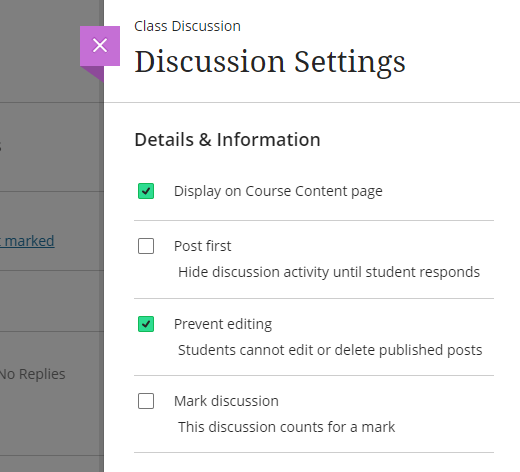
More information about setting up and using Ultra discussions is available at: Blackboard Help – Create Discussions
Improved engagement analytics in Ultra courses
Following the March upgrade, staff will be able to get a quick overview of their students’ engagement in their Ultra courses.
Under ‘Course Activity’ in the Analytics section of an Ultra course, staff will be able to see how much time students have spent in their Ultra course, along with the number of days since their last access. Both ‘Hours in Course’ and ‘Days of Inactivity’ will be sortable ascending and descending, and from this view staff will be able to select one or more students and bulk message them.
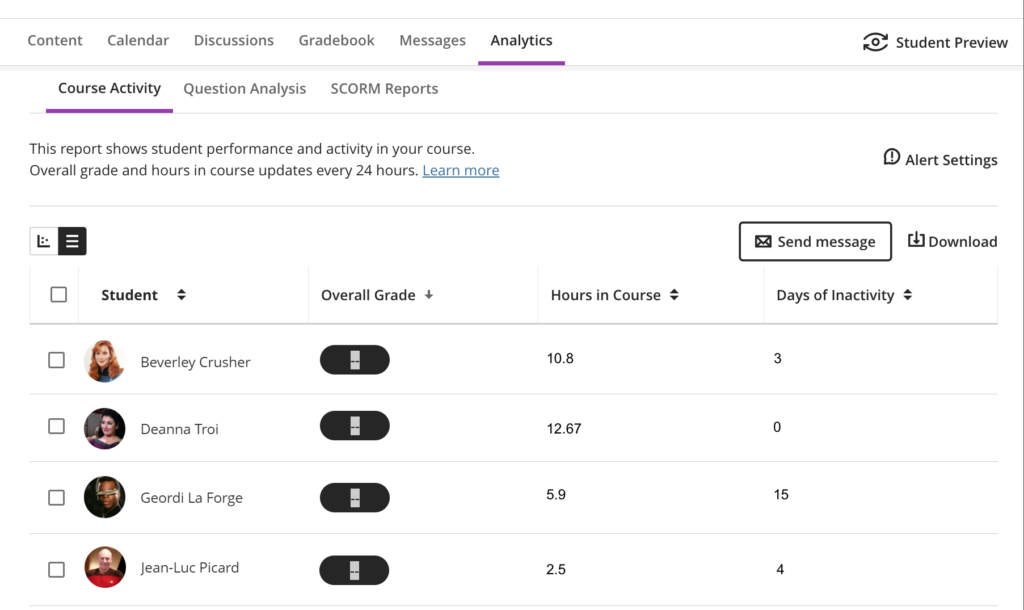
Improved attempt switching when grading student submissions with multiple attempts
When students make multiple submissions to Blackboard assignments in Ultra courses, after the March upgrade it will be quicker and easier to navigate the submissions.
Rather then having to choose which submission to view, staff will immediately be presented with the most recent submission, and will be able to switch between submissions directly inside the submission viewer.
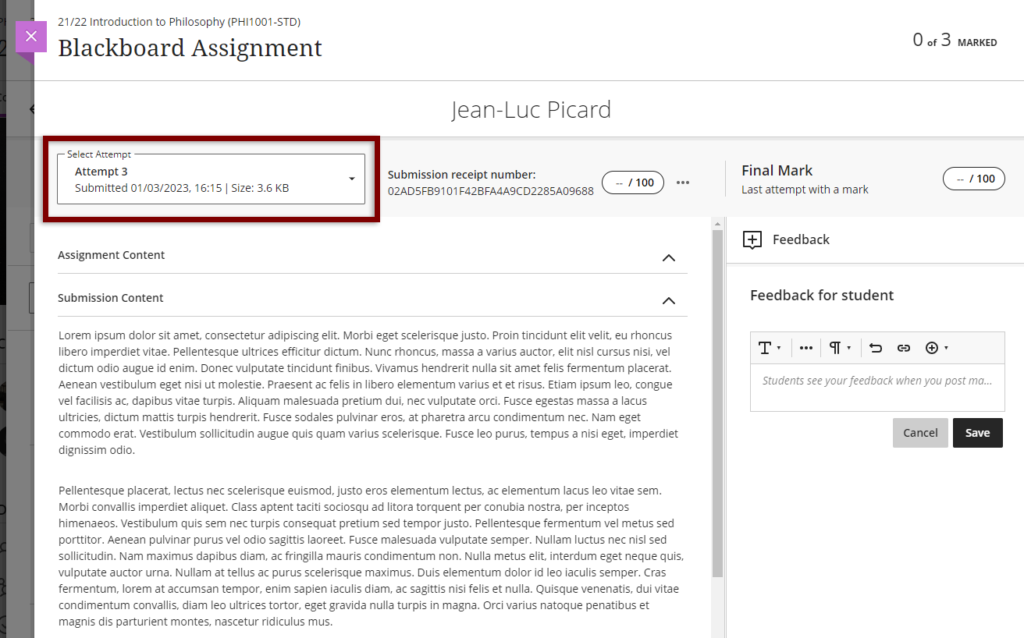
More information
As ever, please get in touch with your learning technologist if you would like any more information about the new features available in this month’s upgrade: https://libguides.northampton.ac.uk/learntech/staff/nile-help/who-is-my-learning-technologist
The use of 3D printing and scanning in the prosthetics and special effects industry is an emerging field with immense potential. In this video case study, technician demonstrator Paddy Costelloe from Games & Computing Software Technology discusses how he took Hair and Makeup students through the entire process of 3D scanning and printing to create prosthetics, from scanning to repairing the scanned data and using Cura software to create 3D prints.
The students discuss how they were able to see the process firsthand, with one of them getting a scan of their face. The goal was to excite the students about the prospects of 3D printing and how it can be used to improve the industry. Students’ comments in the film include; that it was great to see the technology in action after reading about it in theory and that they found the breakdown of the technology easy to understand and could see how they would use it in their future work.
Poppy Twigger, Technician Demonstrator for Hair, Makeup and Prosthetics, highlights the potential of 3D printing in the industry, with 3D printed molds, makeups, and props becoming increasingly common. She emphasizes that while 3D printing would not replace practical effects, it is quickly becoming an integral part of the industry, allowing for a blended procedure that increases the quality and speed of the makeup process. The use of 3D printing in prosthetics and special effects is an exciting development that is set to transform the industry in the coming years.

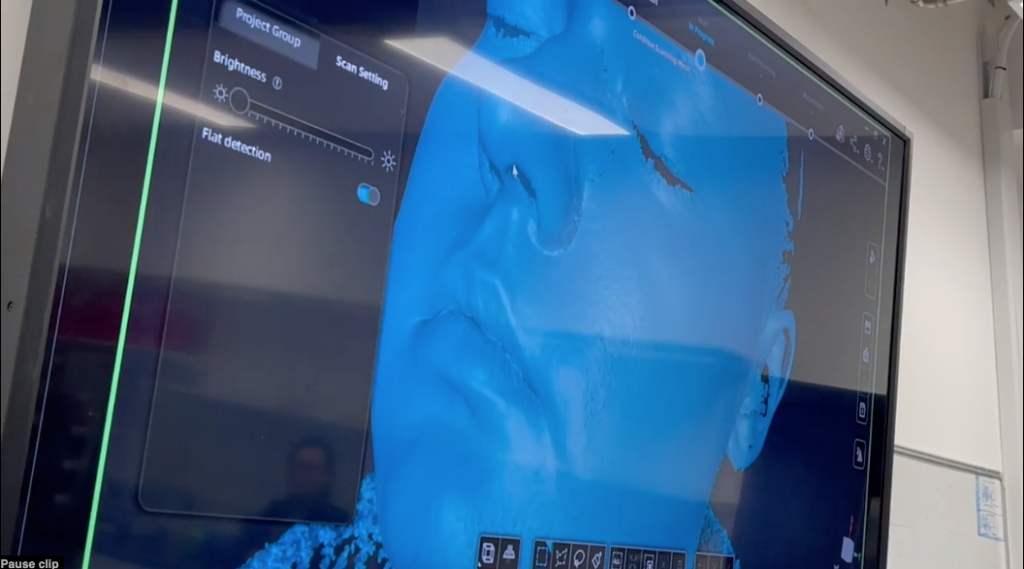
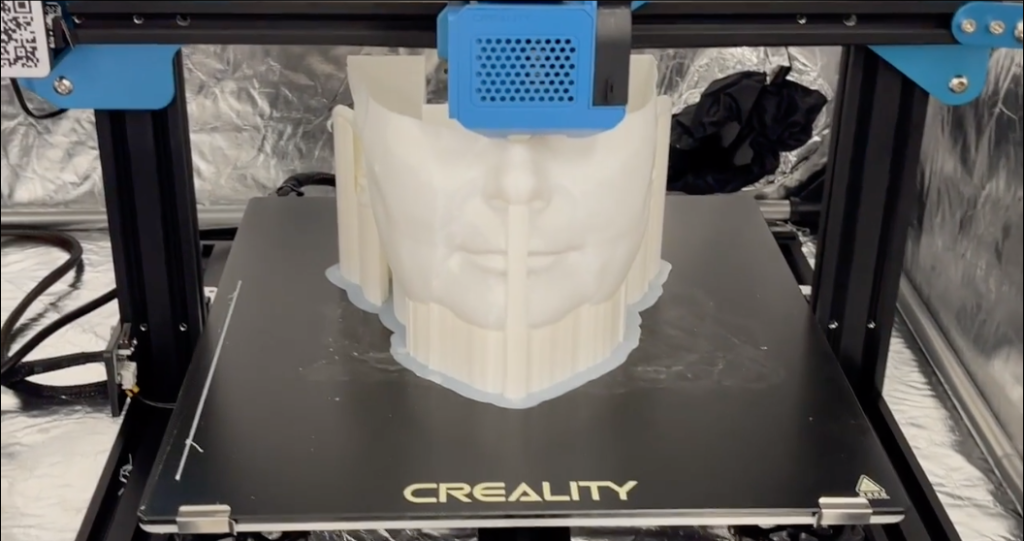
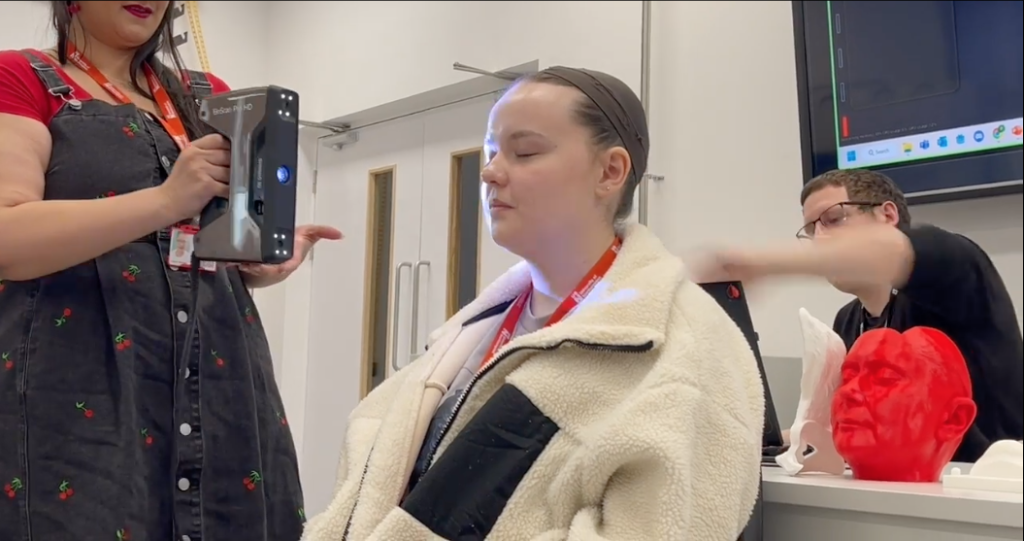
New Ultra Flexible Grading Interface: Technical preview & feedback opportunity
Blackboard are currently developing a new assessment grading interface for Ultra courses, and are looking for academic staff to test and provide feedback on the proposed new flexible grading interface over the coming 4 – 5 months.
The engagement will largely be self-paced, with staff working through various grading workflows (as they get built and added) in their own time, and providing feedback via a survey form. In terms of time commitment, it is envisioned that this will take no more than a couple of hours per month.
If you would like to get involved with this project, and to help shape the design of the new Ultra flexible grading interface, please sign up here: Flex Grading Tech Preview Sign up
The new features in Blackboard’s February upgrade will be available from the morning of Friday 3rd February. This month’s upgrade includes the following new features to Ultra courses:
- Polygon shape tool available when creating hotspot questions in Ultra tests
- Sort items by grading status in the Ultra gradebook
- Students can see other members of their group in Ultra courses
- Ally alternative format views count towards progress in progress tracking
Polygon shape tool available when creating hotspot questions in Ultra tests
Since the November upgrade, staff have been able to create hotspot questions in Ultra tests. Initially, the hotspot area could only be rectangular, but following the February upgrade staff will be able to define complex hotspot areas in Ultra tests using the polygon shape tool.
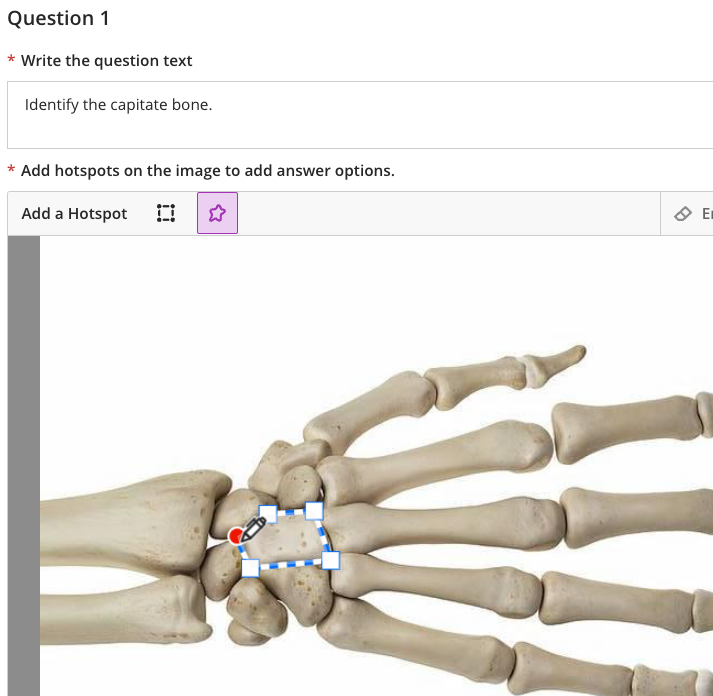
More information about how to add and use hotspot questions is available at:
Sort items by grading status in the Ultra gradebook
Following the February upgrade, when viewing the gradebook in list view, staff can sort the gradebook by the grading status.
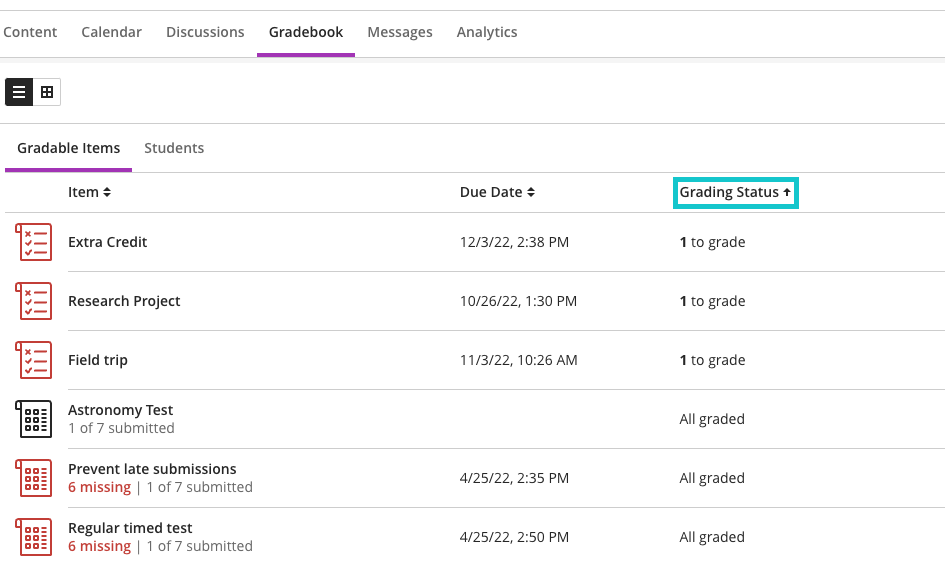
Students can see other members of their group in Ultra courses
After the February upgrade, students who have been assigned to groups will be more easily able to see who they are in a group with. However, they will not be able to see any information about groups that they are not a member of, nor will they be able to view detailed information about their other group members. All that will be disclosed when viewing other group members will be their name, their role in the course, and their profile image if they have uploaded one.
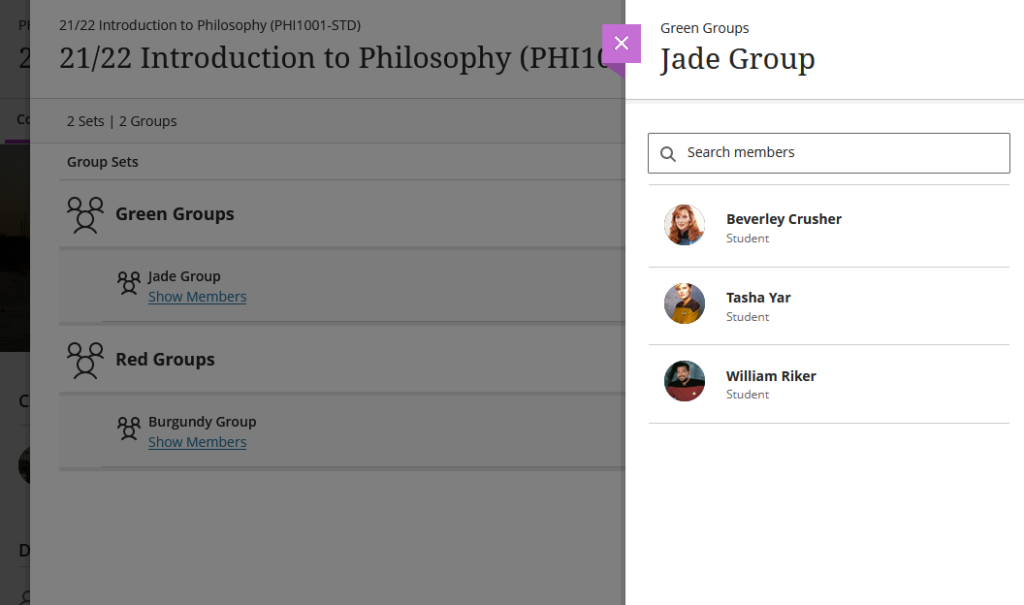
Ally alternative format views count towards progress in progress tracking
When documents are uploaded into NILE they are automatically made available in various additional accessible formats by Ally. Following the February upgrade, when students download and view one of Ally’s accessible versions of a document, this will be tracked by Ultra’s progress tracking tool.
You can find out more about Ally at:
More information
As ever, please get in touch with your learning technologist if you would like any more information about the new features available in this month’s upgrade: https://libguides.northampton.ac.uk/learntech/staff/nile-help/who-is-my-learning-technologist

You may have seen films where artificially intelligent devices either help or hinder humans – but where is it all going?
Artificial Intelligence will increasingly form part of our daily lives but what actually is it and what might be the benefits and challenges for us in our future home, study and work environments?
The debate, moderated by the UK’s National Centre for Artificial Intelligence, will raise questions for all of us about the way in which this technology will impact our lives.
This session is aimed at everyone, regardless of their background and level of expertise.
Hear both sides of the argument and vote at the end!
This event is taking place in person and online.
In person details and registration:
https://AIdebateinperson.eventbrite.com
Online details and registration:
https://AIdebateonline.eventbrite.com
Simulation has become an integral part of teaching and learning pedagogy within the Health Faculty at UON. In order to operationalise the faculty’s simulation strategy, a lead for simulation was recruited in September 2022. Roshini Khatri, Head of Health Professions, explains why:
“Simulation is used regularly in Healthcare as a learning and teaching technique to create situations or environments to allow persons/students to experience a demonstration of real-life scenarios for the purpose of practice and learning in a safe and nurturing environment. We have chosen to embed simulation as part of our curriculum to ensure that we are using contemporary and innovative activities to support the healthcare professionals of the future.”
The new Academic Lead for Simulation, Kate Ewing, is passionate about how the use of simulation and virtual reality scenarios can create more immersive, engaging, and more productive learning outcomes. Kate explains that simulation ranges from a technical skill, for example, where students might be learning to catheterise, to a more immersive scenario which is designed to give students the opportunity, in a safe and controlled environment, to experience a clinical situation.
(Click the image or text link below to launch the video in a new tab)
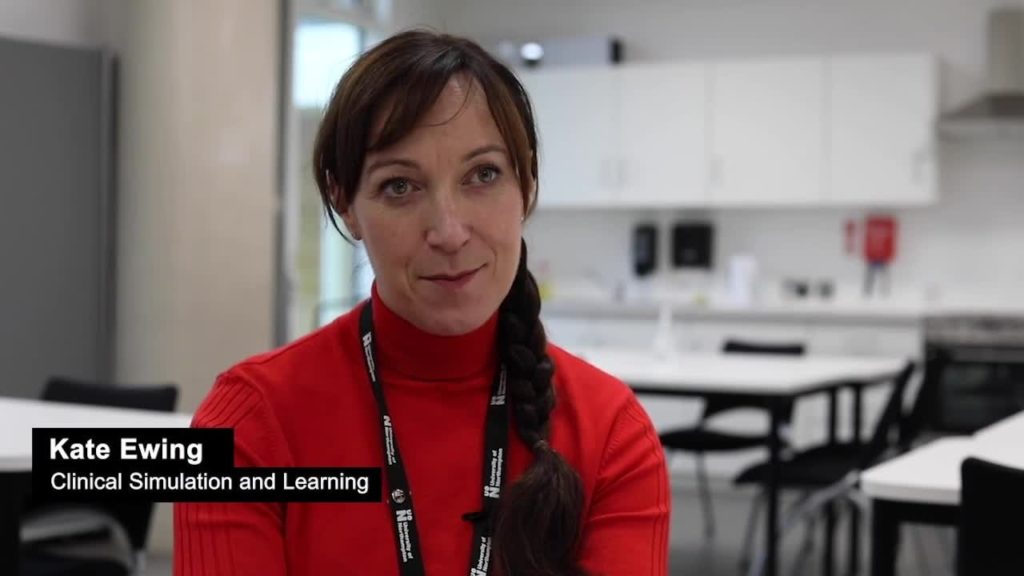
Video: Interview with Kate Ewing and Hannah Cannon
The challenge Kate has, is scenarios need to be written and carefully constructed with learning outcomes at the forefront. Kate admits this can create a ‘heavy workload’ for academic staff, so her aim is to see how these scenarios can be utilised across programmes so they fulfil a range of learning outcomes; allowing students to work inter-professionally with each other, rather than having a single use.
Kate is aware of the limitations of this technology when utilised by small groups or individuals at a time. However, Kate’s strategy provides a “shift in thinking” which encompasses all of the students in the learning process. In her learning situations, the students become observers of the process taking place. Kate comments: “Evidence says, if you debrief the situation and the learning in the right way, observers gain as much as the participants. The simulation is seen as an excuse for a debrief – the debrief is where the rich learning takes place”.
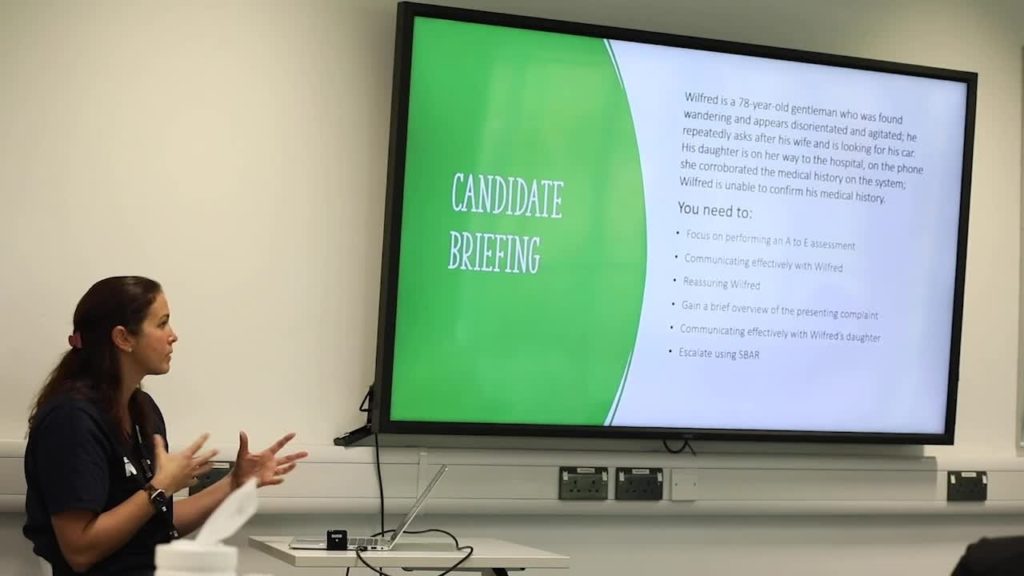
Kate highlights how simulations in a learning environment are very different to clinical settings. “Students aren’t just testing out their skills, as they might do in a clinical environment, rather, they are developing skills of communication and those human factors which require a more intricate debrief strategy”. Although Virtual Reality (VR) scenarios contain published debriefs, Kate feels strongly these need customising so they can be mapped closely to the learning outcomes of individual programmes at UON.
Hannah Cannon, Practice Lead for Nursing Associates, has been working with students on their clinical skills using a VR platform in a whole class situation. Hannah said that in her experience, students seem to feel “really safe” when engaging with scenarios in this way. Her students can play through a scenario safely without the need to worry about the consequences of their decision–making. Hannah believes by having a group of students present, it allows for a more productive and wider discussion about patient care. As a team, the students can work together to make decisions about the patient’s treatment.
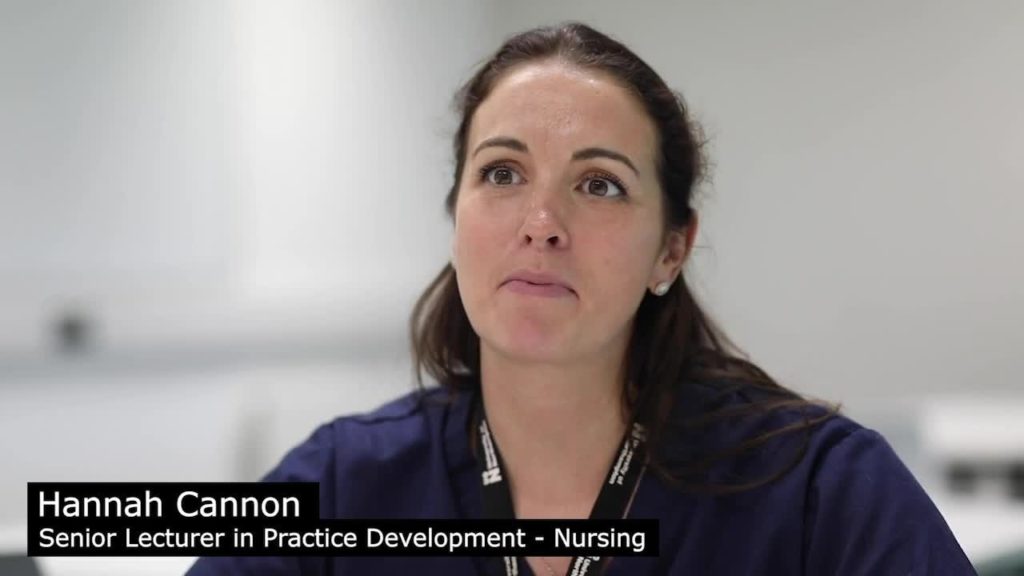
Hannah emphasises how the use of a debrief, which is usually twice as long as the scenario, permits her students to have more effective discussions about the scenario and to reflect on their decision-making. Hannah feels this style of immersive learning allows her students to better grasp their learning outcomes by having the opportunities to see their decision-making play out and then by reflecting on the end result. She goes on to say that it, “heightens student’s self-awareness both professionally and personally,” which she feels is fundamental in nursing care.
Although immersive and engaging, Kate understands simulations are not an “easy answer” to fulfilling learning outcomes at UON, due to their time-consuming nature. But Kate is passionate that, through her role, she will be able to help create a strategy that supports staff to not only fulfill learning outcomes in a more productive way within their own programme, but to enable collaborative scenario-based learning to be adopted across programmes in a more cohesive and versatile way.
Would you like to meet with members of Blackboard’s Product Management Team, and to have some input into the development of the groups tools that are available in Ultra courses?
If so, Blackboard are hosting an online Ultra groups tools focus group specifically for staff at the University of Northampton at 3pm on Monday the 23rd of January.
If you would like to attend, please email Robert Farmer: robert.farmer@northampton.ac.uk
Virtual reality (VR) and augmented reality (AR) are quickly gaining traction at the University as effective technologies for teaching and learning.
With VR in particular, it is tempting to imagine a world in which students fit their headsets for a complete University experience. However, as these four films show the reality is more interesting at UON with academics exploring how these technologies can be used in a wide range of creative ways in the classroom.
The first film explores how in 2022-23 Senior Lecturer in Marketing Kardi Somerfield worked with the Police Fire and Commissioners office on a live VR brief to create a virtual reality scenario to promote safer student experiences in Northampton.
(Click the images or text links below to launch the videos in a new tab)
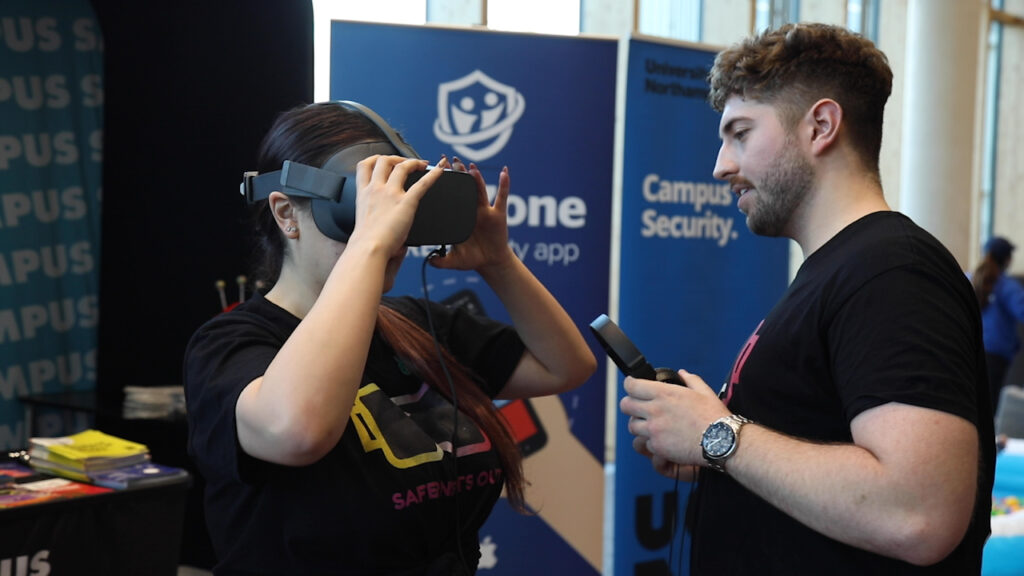
Video: Interview with Kardi Somerfield – Safer Northampton VR Project Duration: 3.55
Using a RiVR Link system the Second-year Digital Marketing students conceptualised, planned, recorded, edited, and released their unique VR experience with accompanying branding including flyers, T-shirts, and signage.
The project was launched to widespread acclaim and media attention, providing the students with highly valuable digital skills. It is an exemplar of how VR technologies can be used creatively as content creation tools in subject areas that are non-technical.
The second film looks at how the subject area of Health is using VR and XR technologies. Sims Lead Kate Ewing and Nursing Senior Lecturer Hannah Cannon discuss how VR software is helping to develop nursing students’ critical skills through the use of interactive hospital scenarios. The simulation tools are used in combination with debriefing discussions that provide rich learning experiences matching the tutor’s individual learning outcomes.
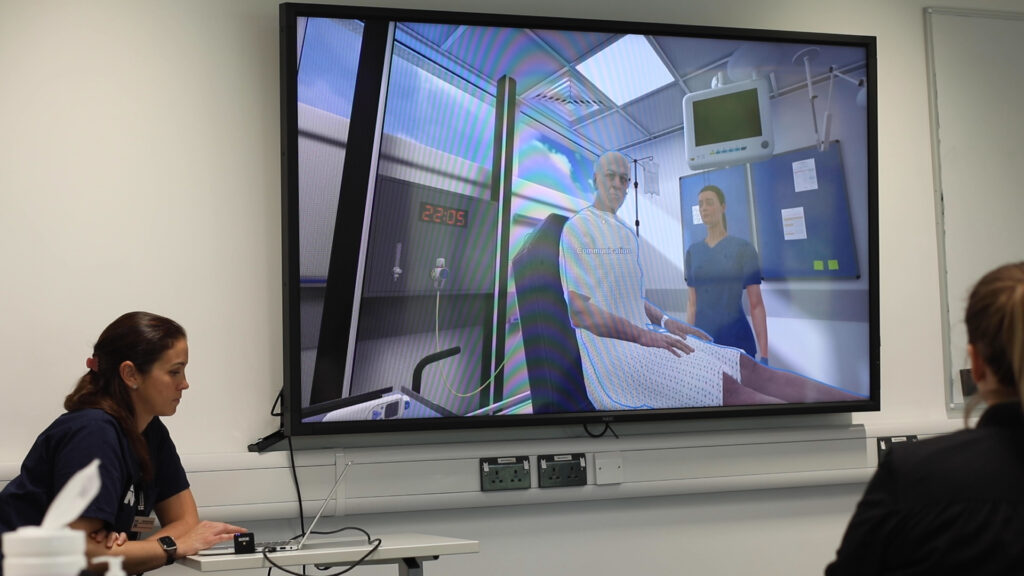
Video: Interview with Kate Ewing and Hannah Cannon on Developing Health Simulations. Duration: 7.41
Our next video case study focuses on how Senior Lecturer in Games Design David Nicholls works with his students to create prototype VR games. He discusses how VR and XR are areas that are both very popular with students and have huge potential for their future employability. So much so, that he is currently collaborating on the development of VR projects across multiple subject areas within the University.
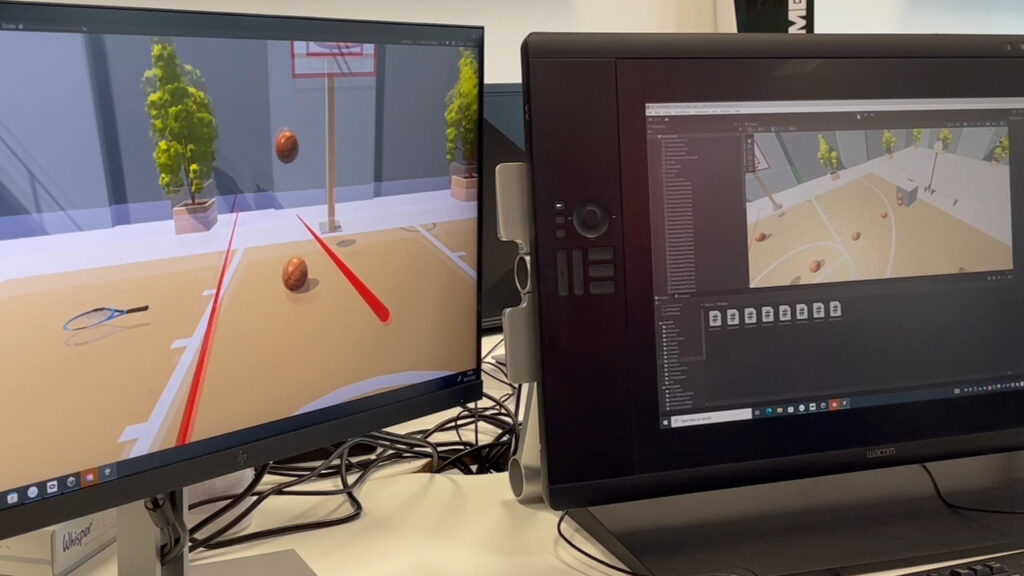
Video: Interview with David Nicholls on use of VR in Games Design. Duration: 2.17
And finally, the last film in this series looks at how the University’s CENTRE FOR ACTIVE DIGITAL EDUCATION (CADE) has launched a number of Special Interests Groups (SIGs) for new technologies such as XR (including MR, VR and AR), Artificial Intelligence (AI), Distance Learning (DL) and Game-Based Learning (GBL).
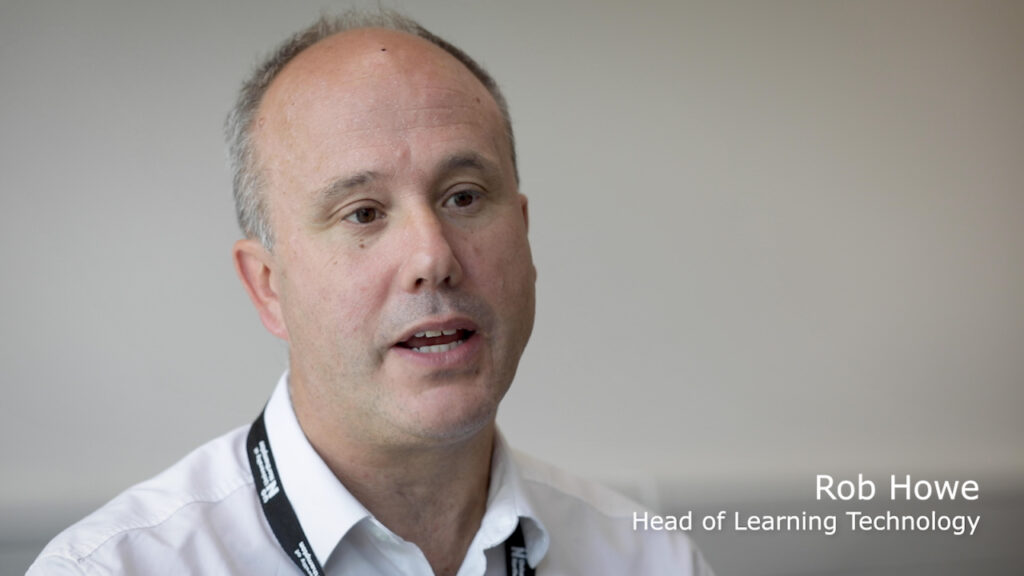
Video: Interview with Rob Howe on CADE and VR special interest groups. Duration 2.42
Head of Learning Technology Rob Howe explains that CADE is a platform for creative discussion on the teaching and learning opportunities afforded by these extended reality technologies, and how by taking a strategic approach to the development of XR and working collaboratively more students and staff will benefit from our expanding expertise in this area.
For more details on the CENTRE FOR ACTIVE DIGITAL EDUCATION (CADE) and to join the discussions please see: https://www.northampton.ac.uk/research/research-institutes-and-centres/centre-for-active-digital-education-cade/
The new features in Blackboard’s January upgrade will be available from the morning of Friday 6th January. This month’s upgrade includes the following new features to Ultra courses:
- Prevent students from editing or deleting Ultra discussion posts after the due date
- Model answer question type supported in Ultra tests
- Improvements to Ultra test randomisation options
Prevent students from editing or deleting Ultra discussion posts after the due date
Prior to the January upgrade, students could continue posting to Ultra discussions after the due date had passed. This created problems for staff when grading discussions. Following this month’s upgrade, staff can automatically lock the discussion after the due date has passed. When ‘Stop discussion activity after due date’ is selected, students can’t create, reply to, or edit posts after the due date. Students with a due date accommodation can continue to create, reply to, and edit posts after the due date.
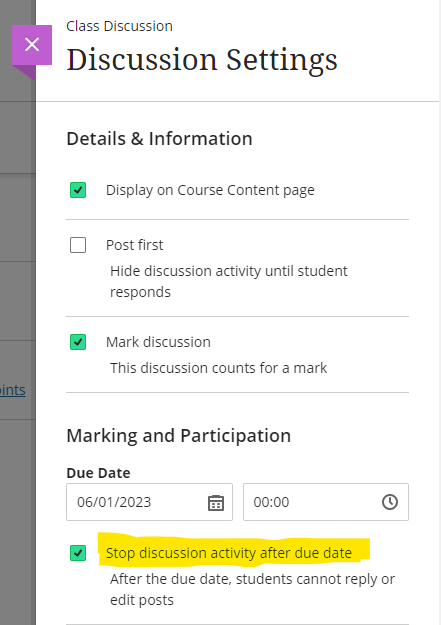
You can find out more about setting up and using discussions in Ultra courses at: Blackboard Help – Ultra Discussions
Model answer question type supported in Ultra test
Following the January upgrade, when adding an essay question to an Ultra test, staff will be able to include a model answer. The model answer will always be available for staff to view when marking the test, and staff can also configure the test settings to allow students to see the model answer once they have taken the test. As would be expected, regardless of how the test is set up, the model answer cannot be seen by students while they are completing the test.
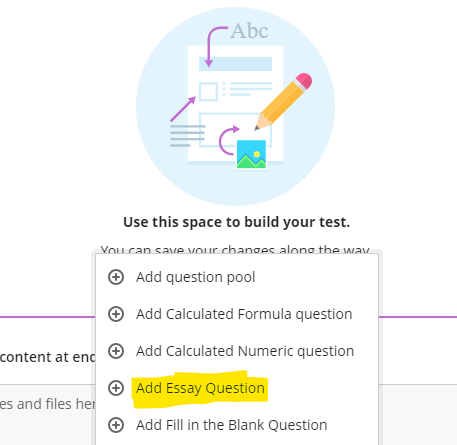
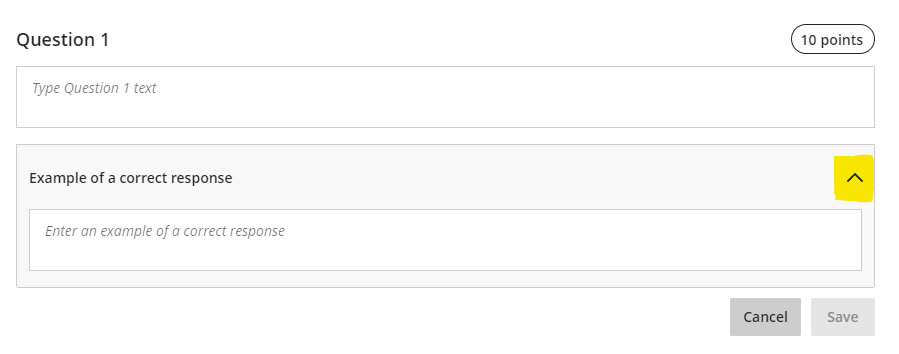
The option for students to view the model answer is controlled by the ‘Correct Answers’ setting in the ‘Assessment results’ section of the Ultra test settings panel.
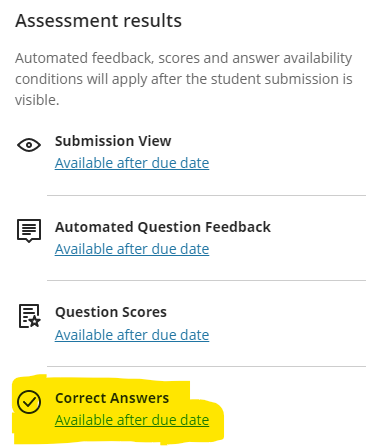
Please note that the essay question must be marked in order to display the model answer to students. Therefore, where staff are using model answer questions in a formative test in which students are required to judge their own response(s) against the model answer(s), a quick option for staff would be to assign 1 point per model answer question, and to award the point to everyone who submitted an answer, thus revealing the model answer to students who view their test results.
You can find out more about setting up and using Ultra tests at: Blackboard Help – Ultra Tests
Improvements to Ultra test randomisation options
Prior to the January upgrade, staff were not able to randomise test questions if the test contained text blocks, files, or images. Following the upgrade, staff will be able to enable randomisation when the test has text blocks, files, or images, as these non-question elements will be locked in place, and the test will randomise the questions between the non-question elements.
Staff will also be able to randomise questions in a test that contains page breaks, as the questions will randomise within their assigned page. If a page contains non-question elements, the questions will randomise between those elements.
When there are pages for the test, staff can also randomise page order. If staff randomise the page order, they can also choose to lock the first page into position. This is particularly important if the first page of the test is a cover page or contains test instructions.
You can find out more about randomising Ultra tests at: Blackboard Help – Ultra Tests: Randomising questions and answers
More information
As ever, please get in touch with your learning technologist if you would like any more information about the new features available in this month’s upgrade: https://libguides.northampton.ac.uk/learntech/staff/nile-help/who-is-my-learning-technologist
The new features in Blackboard’s December upgrade will be available from the morning of Friday 2nd December, with the exception of the drag-and-drop and course links improvements, which should be available by Monday 5th December. The December upgrade includes the following new features to Ultra courses, some of which were specifically requested by staff in our ‘What new features do you want to see in your Ultra courses?‘ survey:
- Drag-and-drop content re-ordering improvements
- Course links
- Single student progress report
- Improvements for copying content
- Question banks descriptions and search
- Simpler exit actions for student preview
- Improvements to ‘needs grading’ count for Blackboard Ultra assignments
Drag-and-drop content re-ordering improvements
In response to feedback that the drag-and-drop content re-ordering function was clumsy and difficult to use, Blackboard have improved the way that it works. Following the upgrade, staff should find it easier to grab and move content items in their Ultra courses. Please also note that the location of the content re-ordering tool has moved from the right to the left-hand side of the content item.
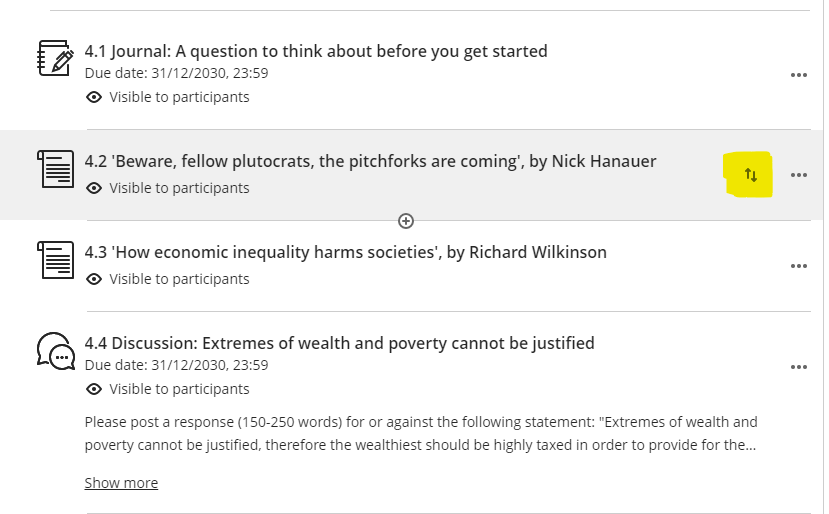
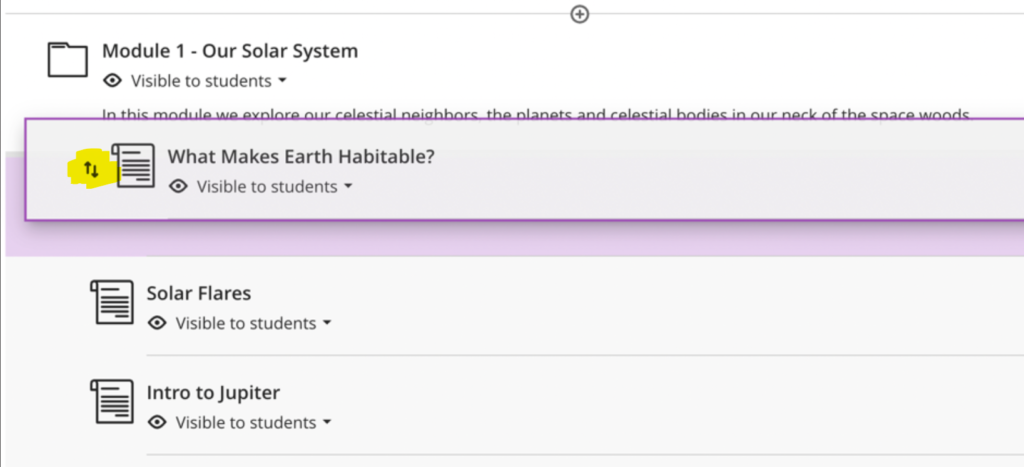
Course links
As well as adding links to external web sites, etc., following December’s upgrade, staff will be able to add internal links to items already in an Ultra course. To create a course link, add a new link, and select ‘Create Course Link’.

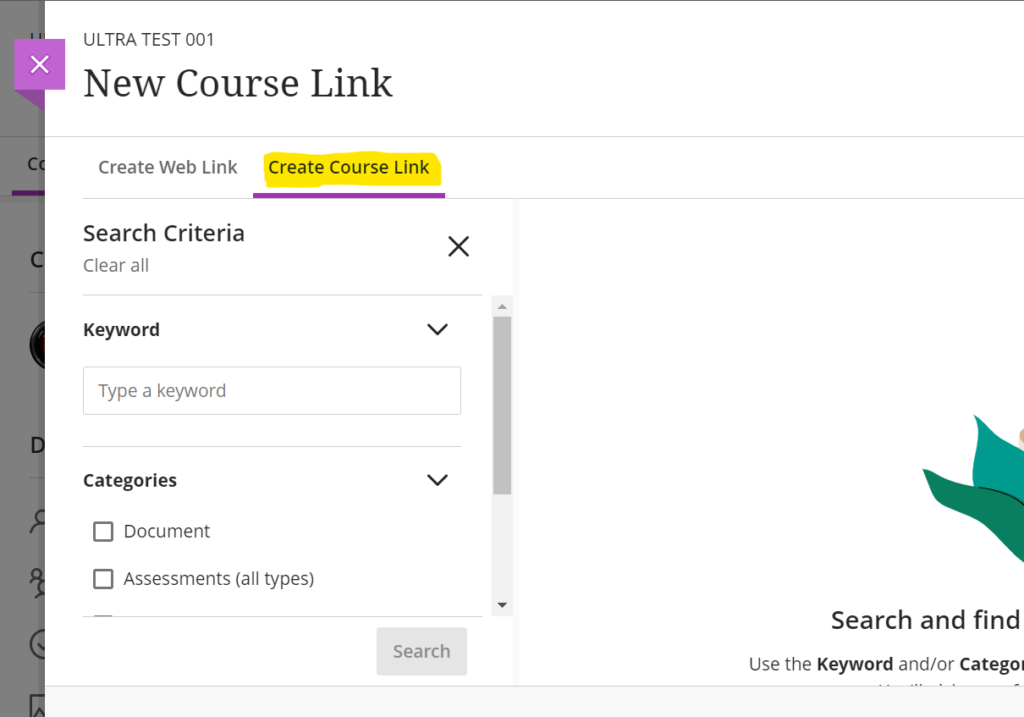
In this initial release of the course link tool there are some limitations, but the functionality is expected to develop and improve over the coming upgrades.
Linking Exceptions
- In this release, staff cannot create course links using the content editor.
- In this release, staff cannot create course links to folders, learning modules, discussions, and web links.
- Course links to learning modules where force sequence is enabled cannot be created. This is because links could allow users to access something they should not yet access. If a course link to a learning module exists, it will not be possible to enable forced sequence.
Copying Content
When a course is copied into a new course, course links are updated to link within the new course. However, there are exceptions:
- In this release, staff cannot copy course links for documents and third-party LTI content, i.e., course links to anything originally added via the content market, e.g., Turnitin assignments, Kaltura videos, Leganto reading lists.
- When copying or converting from an Original course, the copy process will exclude course links for folders, learning modules, and web links.
Single student progress report
Following on from last month’s upgrade, in which Blackboard introduced the ability for staff to find out more about how their students were interacting with Ultra courses, December’s upgrade adds additional functionality to the course analytics options.
When in grid view in the Ultra gradebook, selecting a student’s name will open up the student grades overview page, which shows an overview of all of that student’s grades in the course. After the December upgrade, staff will be able to view a progress report for a student, as well as details of the last time that the student was active in the course, along with a student activity link.
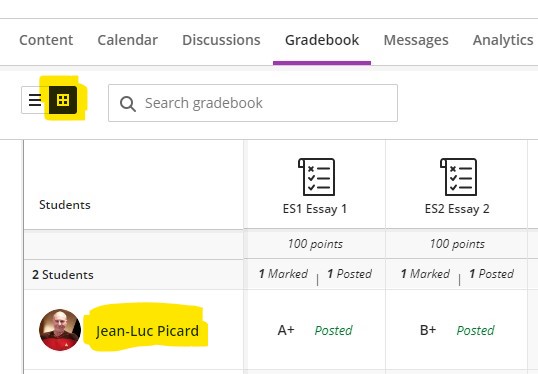
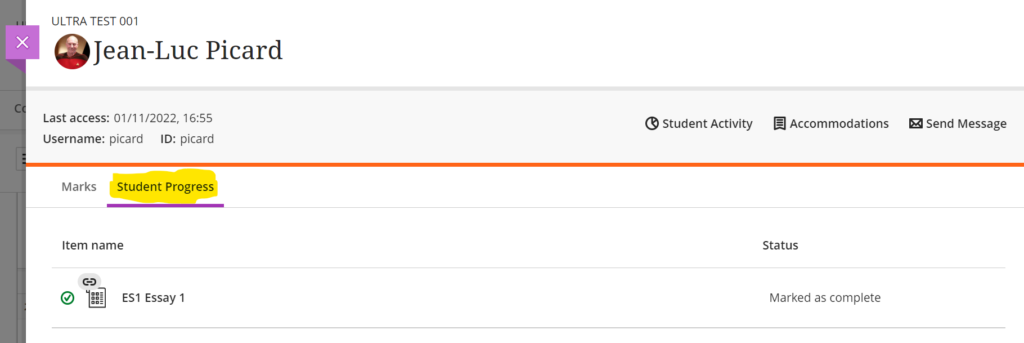
Improvements for copying content
When copying content into an Ultra course, the copy content panel is quite narrow, which can make it difficult to navigate. December’s upgrade introduces a new, expanded copy content panel.
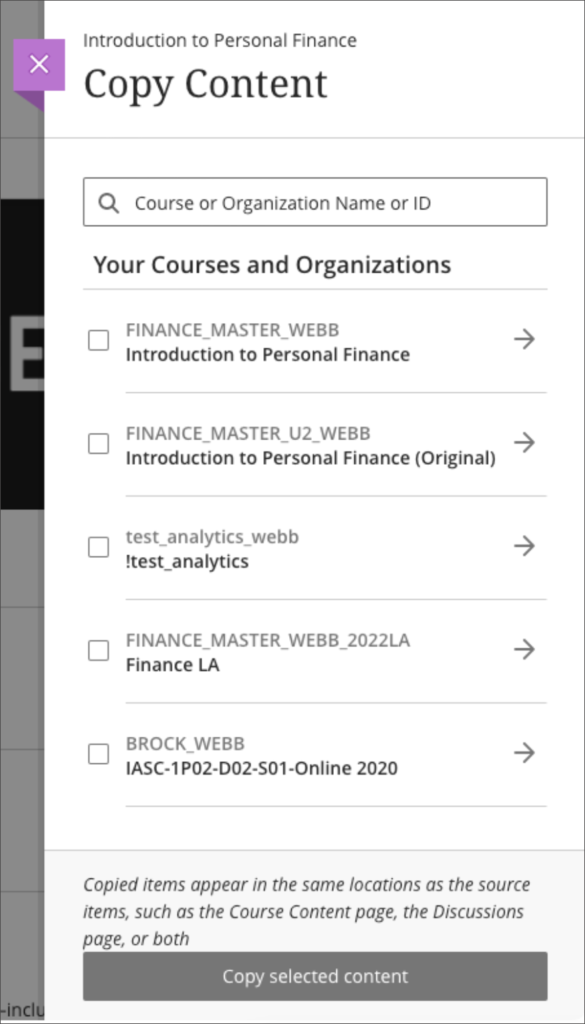
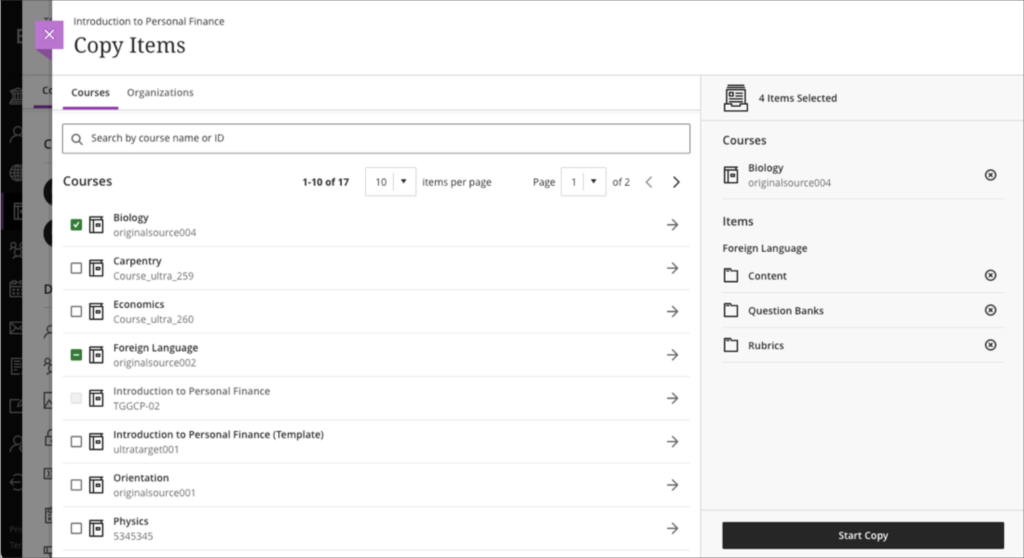
Staff can find out more about copying content into Ultra courses at: Blackboard Help – Copy Content from Other Courses
Question banks descriptions and search
Following December’s upgrade, staff will be able to add a description to a question bank. These descriptions may be useful for noting the topics or objectives the questions cover. The question bank description is displayed with the question bank title on the question banks page.
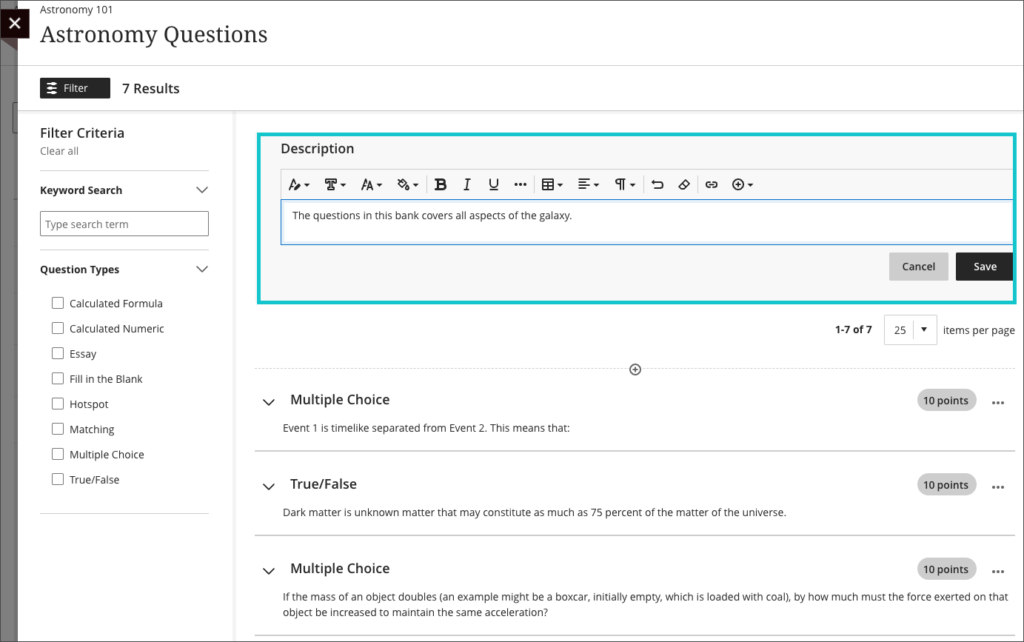
December’s upgrade will also bring in the option to search questions banks, with the search facility searching both the name and the description fields of the question bank.
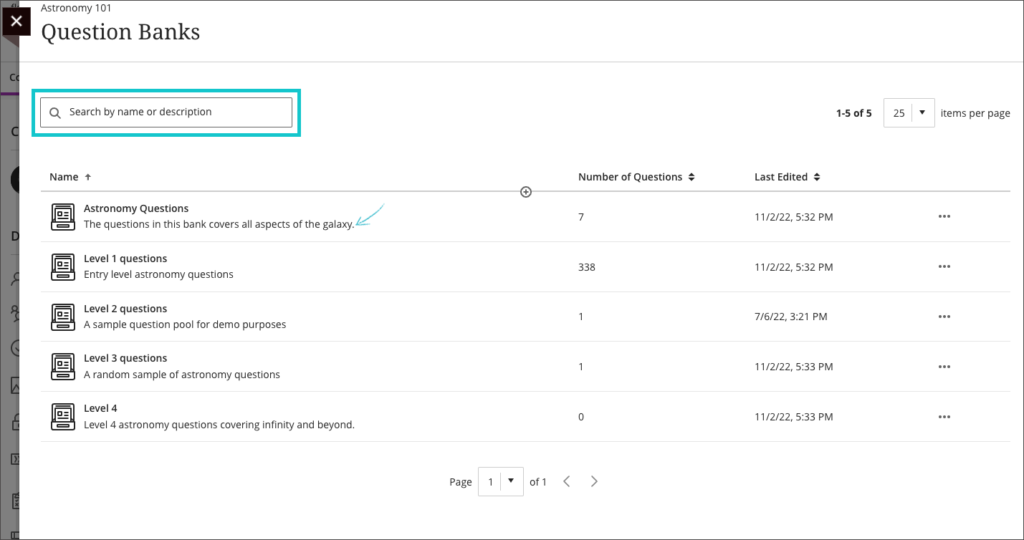
Staff can find out more about using question banks at: Blackboard Help – Question Banks
Simpler exit actions for student preview
December’s upgrade will bring in simpler exit process when viewing a course in student preview mode, allowing staff to exit in two clicks, instead of three.
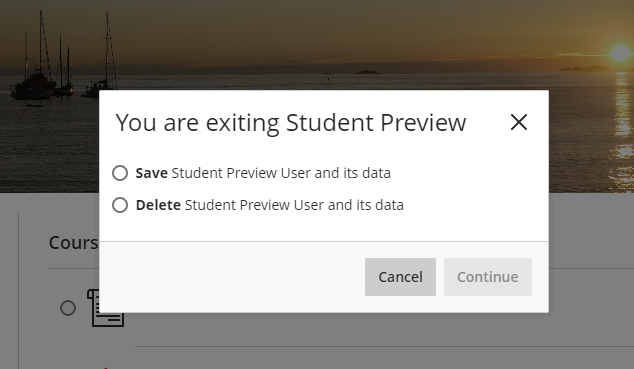
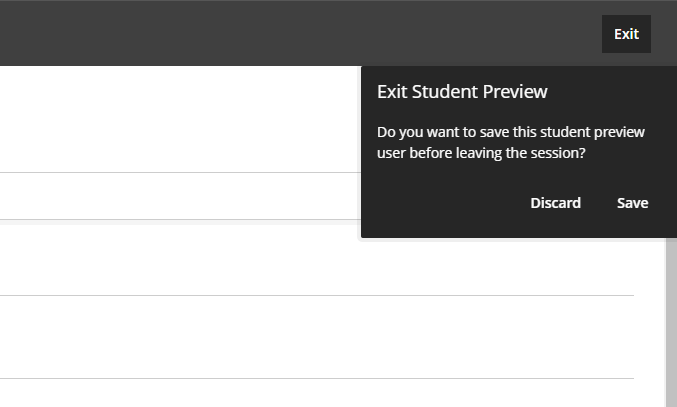
Improvements to ‘needs grading’ count for Blackboard Ultra assignments
In addition to the above improvements, December’s upgrade also improves the way that the needs grading count works, as it has sometimes provided an incorrect count of the number of items which required grading when assessing work with multiple attempts where ‘last attempt with a grade’ or ‘first attempt with a grade’ was selected in ‘Mark attempts’ in the assignment settings.
More information
As ever, please get in touch with your learning technologist if you would like any more information about the new features available in this month’s upgrade: https://libguides.northampton.ac.uk/learntech/staff/nile-help/who-is-my-learning-technologist
Recent Posts
- Learning Technology Team Newsletter – Semester 2, 2023/24
- Getting started with AI: A guide to using the Jisc Discovery Tool’s new AI question set.
- Blackboard Upgrade – April 2024
- Exploring the Role of GenAI Text to Enhance Academic Writing: A Conversation with Learning Development Tutor Anne-Marie Langford.
- Interview with the University’s Digital Skills Ambassador
- Blackboard Upgrade – March 2024
- Case study: GenAI in BA Fashion, Textiles, Footwear & Accesories 2024
- Exploring the Educational Potential of Generative Artificial Intelligence: Insights from David Meechan
- Exploring the Fusion of Fashion and Artificial Intelligence: Jane Mills’ Pioneering Journey – Vulcan Sessions Talk.
- Artificial Intelligence Meets Drama: Matt Bond’s PlayAI Project Chronicles the Journey
Tags
ABL Practitioner Stories Academic Skills Accessibility Active Blended Learning (ABL) ADE AI Artificial Intelligence Assessment Design Assessment Tools Blackboard Blackboard Learn Blackboard Upgrade Blended Learning Blogs CAIeRO Collaborate Collaboration Distance Learning Feedback FHES Flipped Learning iNorthampton iPad Kaltura Learner Experience MALT Mobile Newsletter NILE NILE Ultra Outside the box Panopto Presentations Quality Reflection SHED Submitting and Grading Electronically (SaGE) Turnitin Ultra Ultra Upgrade Update Updates Video Waterside XerteArchives
Site Admin

